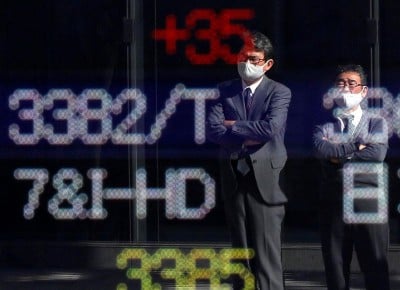Marketmind: Stocks break higher, but for longer too?
 © Reuters. Passersby wearing protective face masks are reflected on a stock quotation board outside a brokerage, amid the coronavirus disease (COVID-19) outbreak, in Tokyo, Japan November 10, 2020. REUTERS/Issei Kato/File photo AUD/USD +0.17% Add to/Remove from Watchlist Add to Watchlist Add Position
© Reuters. Passersby wearing protective face masks are reflected on a stock quotation board outside a brokerage, amid the coronavirus disease (COVID-19) outbreak, in Tokyo, Japan November 10, 2020. REUTERS/Issei Kato/File photo AUD/USD +0.17% Add to/Remove from Watchlist Add to Watchlist Add Position Position added successfully to:
+ Add another position Close US500 +1.06% Add to/Remove from Watchlist Add to Watchlist Add Position
Position added successfully to:
+ Add another position Close
By Jamie McGeever
(Reuters) - A look at the day ahead in Asian markets from Jamie McGeever, financial markets columnist.
Asian markets are set to open higher on Tuesday as investors look through developments in the Middle East and rising geopolitical tensions, and take heart from an otherwise more benign U.S. economic and corporate backdrop.
Wall Street's performance on Monday - the three main indexes rose between 0.9% and 1.2% - will probably set the tone for Asia, where there are no major market-moving economic indicators scheduled for release.
That will change on Wednesday with a raft of Chinese data, including third quarter GDP. Perhaps the most important event in Asia on Tuesday will be the release of the minutes of the Reserve Bank of Australia's policy meeting this month.
The Aussie dollar is languishing near a one-year low against the U.S. dollar, but snapped a three-day losing streak and rose 0.8% on Monday.
The greenback's broad decline on Monday should also help lift risk appetite across Asia on Tuesday, and Wall Street's rally will give investors food for thought too.
There are signs the positive correlation between U.S. stocks and bonds might be weakening, but some context is required - it has been positive since early August, and only a couple of weeks ago was as strong as it has ever been.
A simple rolling 30-day correlation between the S&P 500 and the ICE BofA U.S. Treasury bond index dipped to 0.88 on Monday, still an extremely high level but the lowest this month and down from 0.94 last week.
Monday's equity rally and bond selloff suggest the correlation will weaken further. Could stocks - and global risk appetite, by extension - be gaining a momentum of their own regardless of what the bond market does?
It's a bold call. Or perhaps not, if you buy this scenario: the Fed is done raising rates, economic data points to a 'soft landing', the worst of the earnings slowdown is behind us and the 2024 outlook is indicating double-digit earnings growth.
Or does Wall Street's resilience conduct investment flows into the U.S. between now and the end of the year, and away from other regions like Asia and emerging markets?
The situation in the Middle East, meanwhile, doesn't appear to be weighing too heavily on global risk appetite - implied stock market volatility, gold, the dollar, Treasuries and oil all fell on Monday.
Wall Street's main indexes and the benchmark MSCI indexes for world, Asian and emerging stocks are all higher since the Oct. 7 Hamas attack on Israel.
That said, investors in Asia should keep a close eye on the dollar, which is still trading up near 150.00 yen and over 7.30 yuan.
Here are key developments that could provide more direction to markets on Tuesday:
- Australia central bank October meeting minutes
- Fed's Williams, Bowman and Barkin all speak
- Russian President Putin visits Chinese President Xi in Beijing
(By Jamie McGeever; Editing by Josie Kao)
Marketmind: Stocks break higher, but for longer too?

